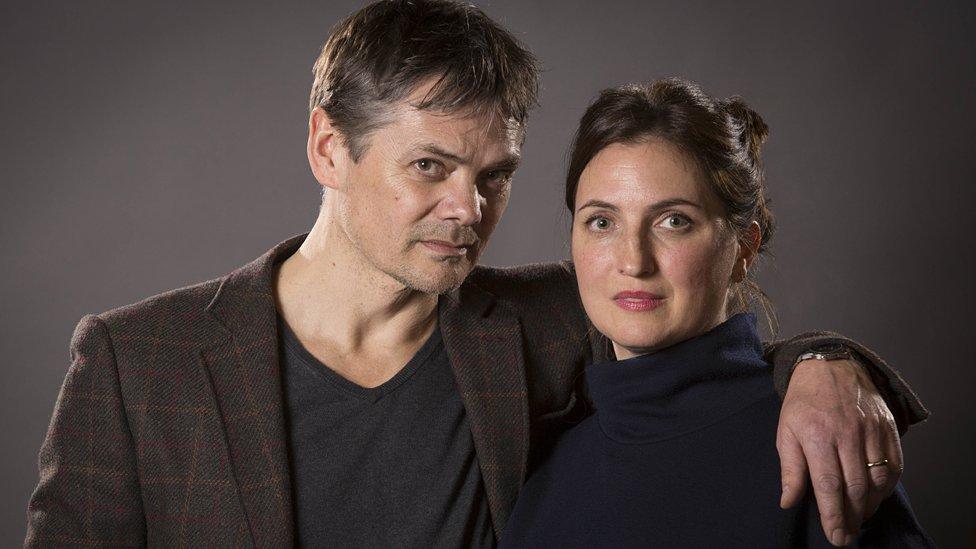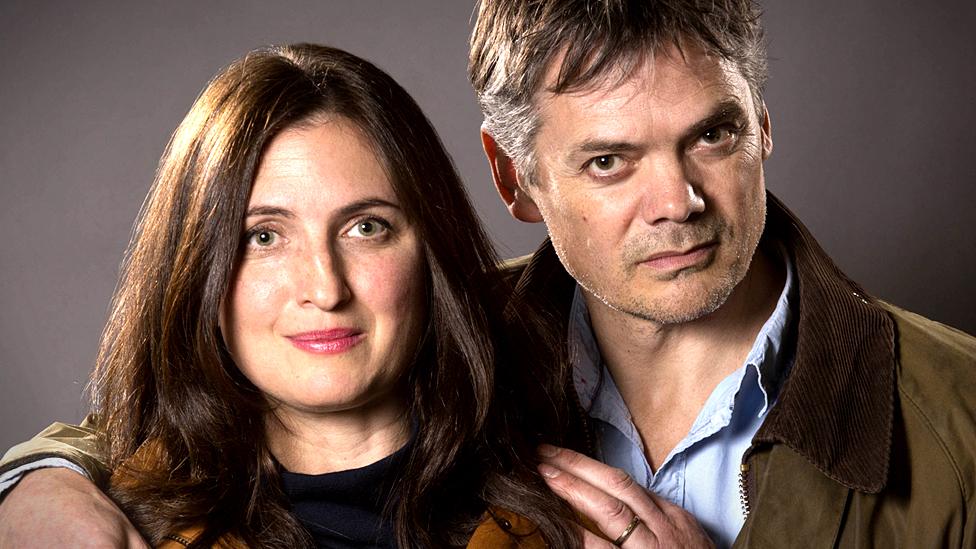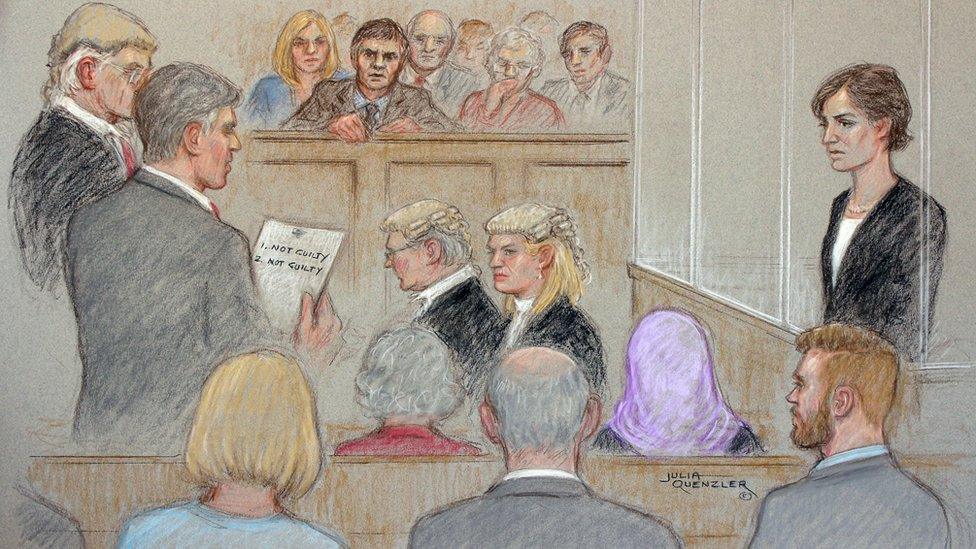Archers verdict: How do domestic abuse survivors recover?
- Published

The jury, seen in the foreground, delivered a not guilty verdict at the end of the episode
The not guilty verdict in The Archers has brought a dramatic twist to a long-running storyline that highlighted the issue of domestic abuse.
Helen Titchener had been taken to court for stabbing her husband, Rob, following two years of domestic abuse but was cleared of attempted murder by a jury in a special hour-long episode of the BBC Radio 4 soap.
However, domestic violence charities say the conclusion to the court case would probably be the beginning of a long road of recovery for a survivor of abuse. So what now for Helen's character?
Polly Neate, CEO of Women's Aid, external, said: "Sadly this is not the end. Domestic abuse perpetrators don't stop because somebody has told them to.
"It's important to get the right support through domestic abuse support organisations to help with the road to recovery."

Helen, played by Louiza Patikas, could face a long road of recovery
Sandra Horley CBE, chief executive of Refuge, external, said: "The control a domestic abuse perpetrator exerts over 'his woman' can last long after a relationship has ended.
"Helen may be free, but she will now have to face the impact Rob's abuse has had on her and her family.
"It can take a long time to begin to recover from these experiences but with specialist support from a charity like Refuge, women like Helen can rebuild their lives, free from fear."
The storyline began more than two years ago when Rob started emotionally abusing his wife which culminated in a dramatic episode where Helen stabbed her husband.

Timothy Watson and Louiza Patikas play Rob and Helen Titchener in the rural soap
The plot was inspired by a new law against "coercive or controlling behaviour" in relationships, with writers consulting lawyers, charities and abuse survivors to get the details right.
Ms Neate said that while Helen's character could report Rob to the police under this new charge, it is likely her main focus will be her recovery.

Controlling behaviour: A range of acts making a person subordinate and/or dependent on their abuser. These include isolating them from sources of support, depriving them of means needed for independence, resistance and escape and regulating their everyday behaviour.
Coercive behaviour: A pattern of acts of assault, threats, humiliation and intimidation or other abuse that is used to harm, punish, or frighten their victim.

She said: "Helen will be suffering from post-traumatic stress. You can't unlive an experience like that. But survivors can get the specialist support they need to recover and overcome the experience."
Helen will next face her abuser at a family court hearing which has been set for 14 September where custody of her two sons will be decided.
Fans of the programme were left with the chilling threat that Rob issued to Helen after she was discharged from the court room following the not guilty verdict.
He told her: "You might have fooled everyone else but you haven't got rid of me - and as long as we have a child together you never will."

Rob, played by Timothy Watson, issued a chilling threat towards Helen after the not guilty verdict
The threat has led to suggestions that Rob will continue to try to control Helen - a situation many domestic abuse survivors may be confronted with.
Ms Horley said: "I don't know what the storyline now holds for Helen, but it is clear that for Rob, it is far from over. Abusers are rarely truly remorseful and they often blame women for the abuse.
"If the storyline continues to reflect the reality for thousands of women who have experienced domestic violence, Rob may now continue to abuse Helen through the family courts."

Domestic abuse
An estimated 1.3 million women and 600,000 men, external in England and Wales reported experiencing domestic abuse in the year ending March 2015, according to figures from the Office for National Statistics.
A survey by charity Solace Women's Aid found 95 out of 100 female survivors were victims of coercive control, external.
Women's Aid reports that on average two women are killed by a partner or ex-partner , externalin England and Wales every week.
About two-thirds of the residents living in domestic violence refuges are children, external, according to the charity Refuge.
Children living with domestic abuse can suffer from a range of psychological emotions including withdrawal, aggression, nightmares and anxiety, the charity says.

Helen's difficult journey may be set to continue but domestic abuse charities say the ending of the court case sends out an encouraging message for other survivors.
Ms Neate said: "I think the verdict is hopeful as there were jurors in the court who understood domestic violence and cohesive control.
"Hopefully it will make more people understand what domestic abuse is. It sends out a positive message of awareness and understanding."
Millions of fans tuned in for Radio 4's special show and reacted with relief at the not guilty verdict, but as The Archers' outgoing editor Sean O'Connor has suggested the story still has "a long way to go".

Help and advice
National Domestic Violence Helpline, external for women sufferers or those calling on their behalf
Men's Advice Line, external for male sufferers
Broken Rainbow UK, external for lesbian, gay, bisexual and transgender sufferers
Respect Phoneline, external for perpetrators who want to stop

- Published12 September 2016

- Published5 April 2016
